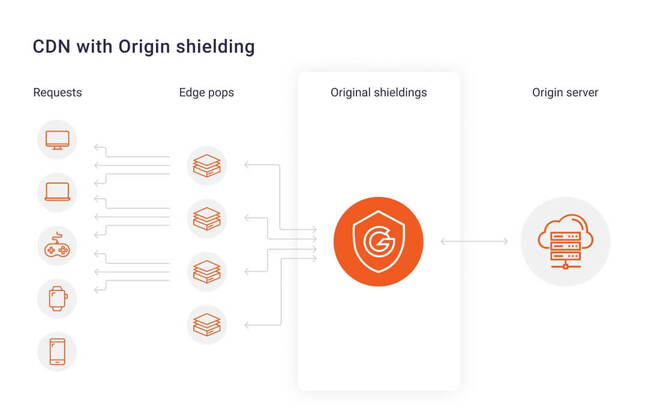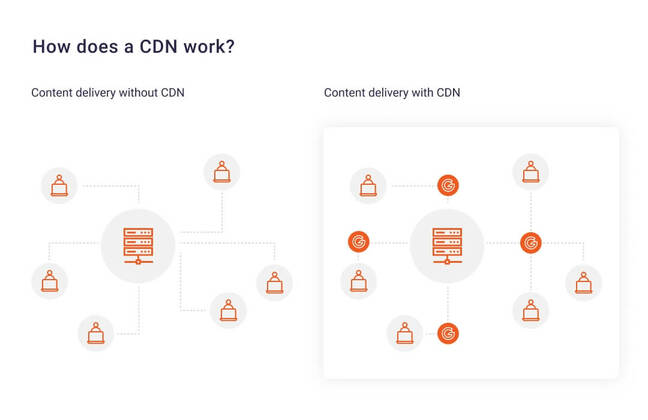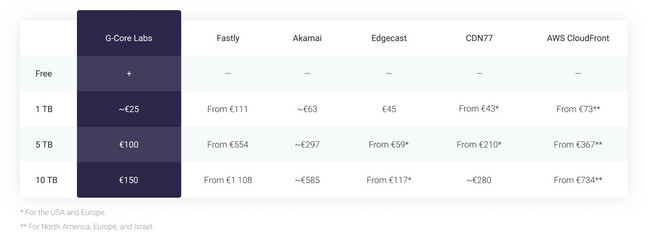This article is more than 1 year old
Nine questions to ask when choosing a CDN provider
Here's your essential checklist for the future
Sponsored Speeding up content delivery seems to be a piece of cake: all you need to do is enable a CDN service.
Yet choosing the best CDN provider may be challenging. You will face many questions: how am I supposed to choose a contractor to whom I can entrust my data, am I sure to achieve cost reduction if I use expensive CDN services, how should I handle the data delivered through latency-sensitive services?
We’ve prepared a comprehensive checklist to help you find the answers to all these
1. What content are you going to deliver?
Static file delivery requires enough bandwidth, yet if you deliver games and streams this parameter should be even higher. Let’s look deeper into details:
- Web content. If most of your content is static, choose a provider with a wide network of points of presence. The equipment should be located in Tier III / IV data centers and in the largest traffic exchange points. This ensures the quality distribution of your content as well as high content delivery speed.
- Video. If you deliver video content, e.g. operate a streaming service, it’s important to choose a provider that can avoid buffering.
- Games and online entertainment. Even milliseconds of latency can result in losing your users. Online games need maximum bandwidth and consistent network performance. This can be achieved by opting for CDN providers that have experience in providing infrastructure to major game developers and publishers. For example, G-Core Labs is a cloud & edge solutions provider whose clients include Wargaming and Sandbox Interactive among others. The company uses brand-new technologies in order to minimize delays while delivering heavy content. For example, the origin shielding technology additionally protects the origin server from high loads when there’s a large number of requests from CDN servers.
2. Where is your core audience located?
The task of a CDN provider is to ensure high-quality content delivery to faraway regions. When choosing a service provider, check where its points of presence are located. The closer they are to your users, the better.
3. Where is your content stored?
Your content can be found in the CDN cache after the content delivery network has received data from the origin storage servers. They store the information starting from the point when a user first requests a specific file. To ensure the fastest delivery of content to the CDN cache, choose a provider that can route traffic and bypass internet downloads interfering with content delivery as origin servers can be located anywhere in the world.
4. Which protocols does the CDN support?
The more reliable the CDN, the better. This becomes even more important when you need to deliver confidential information. To ensure safety, choose a provider that will deliver your data securely using Transport Layer Security (TLS) certificates to create secure HTTP connections. It is just as important that your provider allows you to use your own SSL certificate or obtain a free Let’s Encrypt certificate to ensure confidential communication between clients and servers.
5. Is it safe to store and deliver content via the CDN provider?
Different providers offer different security options. The more options they offer, the better. G-Core Labs offers its CDN users the following options:
- Keyed access (Tokenized URL) protects content from unwanted downloads with a token.
- Origin validation using SSL allows CDN servers to check whether the responding server belongs to the client and whether the SSL certificate on the origin server is valid when the connection is established.
- HTTP header Access-Control-Allow-Origin allows the user’s browser to obtain permission to access resources of a domain other than the one from which the request comes.
- Access policy for countries, domains, IP addresses, and client applications.
- Redirecting from HTTP to HTTPS.
6. Which price policy does the provider offer?
CDN prices vary depending on the amount of traffic that the client needs as well as on the provider’s price policy. Some providers offer free plans for indie developers and small businesses with a monthly traffic limit of up to 100 GB whereas enterprise businesses are often presented with special offers. You can compare the pricing using this table containing the data retrieved from public sources in April 2021:
7. Does the provider’s technical support staff work efficiently and communicate in a needed language?
The expertise of the technical support staff of a CDN provider directly reflects the quality of services. Ideally, a support specialist should have deep knowledge and extensive experience, instantly answering customer questions via online chat or by phone, and there should always be multilingual specialists available.
8. How flexible are the provider’s CDN settings?
This parameter determines how easy and adaptive the CDN settings are. G-Core Labs clients receive all they need to work with the CDN conveniently:
- Convenient API for easy integration.
- Heavy content preloading for faster delivery to users.
- Cache flush (full or selective).
- Caching parameters (setting and managing the cache storage time).
- Settings for flexible management of certain file types or paths.
9. Does the CDN have a personal account with automated settings in it?
Often, large CDN providers don’t offer customers the option of signing up by themselves. In order to create an account, the user must contact a manager who enables the integration with the service. However, customizing the server according to your needs can be very useful. Choose a provider that allows management of all features through a public API or interfaces in your personal account. As a rule, all settings have hints and links to articles in the knowledge base if you want to know more. It’s also important that you can change personal settings at any time without contacting technical support — this will save you a lot of time. Free CDN trial
G-Core Labs users can use the CDN for free during the first 14 days. Provider's solutions are powered by 2nd & 3rd Gen Intel Xeon Scalable processors, and its content delivery network includes more than 100 points of presence in 100+ cities all over the world and was awarded by a Guinness World Record for most simultaneous online players on a single server. The CDN supports all the necessary protocols including HTTP/2, SSL and IPv6 and allows use of flexible system settings like API access, heavy content preloading, and full or selective cache flush.
Sponsored by G-Core Labs



